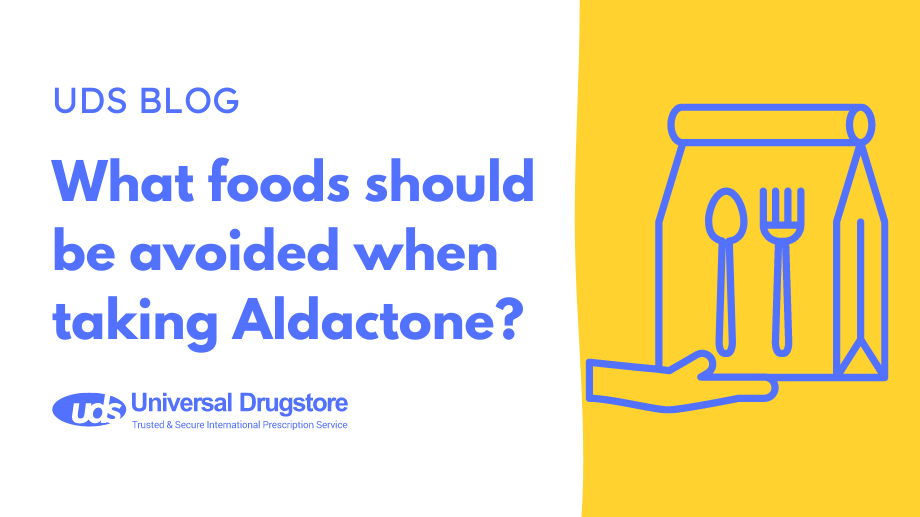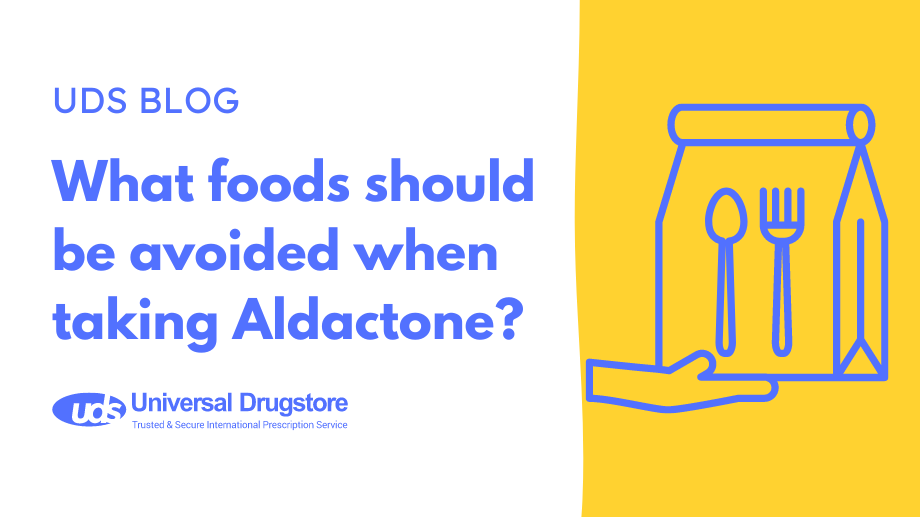What foods should be avoided when taking Aldactone?

Aldactone (spironolactone) is a brand-name aldosterone receptor antagonist and potassium-sparing diuretic. It has a wide range of uses, including heart failure, hypertension (high blood pressure), high aldosterone levels, and swelling due to kidney or liver disease. While Aldactone is typically well tolerated and safe, it can cause side effects, and some foods can affect how it works.
It is important to avoid foods high in potassium or sodium while taking this medication.
Foods that have a lot of sodium such as processed meats, fast foods, and snacks can cause your body to retain extra water. This can make it harder for Aldactone to work since it works by getting rid of extra water.
While potassium-rich foods support your heart health, they increase your risk of hyperkalemia (high potassium levels). You may want to limit these foods. Your healthcare provider can determine how much potassium you should have in your diet.
Some high-potassium foods include:
- Many common fruits like bananas, plums (and the dried version, prunes), apricots, apples, grapefruit, grapes (and raisins), avocados, oranges, tomatoes, and cantaloupe
- Leafy green vegetables such as collard greens, broccoli, asparagus, and spinach
- Many types of beans and legumes, like lima beans, kidney beans, soybeans, pinto beans, and lentils
- Some types of meat, poultry, and seafood such as chicken breast, beef, salmon, tuna, and turkey
- Root vegetables, like carrots and potatoes
- Nuts, such as almonds and pistachios
Other things you should limit or avoid with Aldactone include:
- Potassium supplements, including ones found over the counter, can significantly increase your risk of hyperkalemia while taking Aldactone. If you are currently taking a potassium supplement, let your healthcare provider know before starting spironolactone. Be sure to also check the nutrition labels or drug information of any vitamins or dietary supplements to see if they contain potassium.
- Some salt substitutes marketed as light salt or low-sodium salt alternatives contain potassium chloride and should not be used if you are taking Aldactone.
- Drinking alcohol with Aldactone can increase your risk of certain side effects such as dizziness, lightheadedness, and fainting. This is due to a sudden drop in blood pressure, especially when standing up.
How do you know if your potassium levels are too high?
You may have few, if any, symptoms with mild hyperkalemia. If symptoms do develop, they are usually mild and non-specific. Symptoms often come and go or may gradually develop over weeks or months. Some symptoms may include:
- Stomach pain
- Diarrhea
- Muscle weakness
- Nausea and vomiting
- Tiredness
- Tingling or numbness
Dangerously high potassium levels can be life-threatening and require immediate medical attention. Symptoms can include:
- Chest pain
- Shortness of breath
- Heart palpitations
- Arrhythmia (irregular, fast, or fluttering heartbeat)
What medical conditions does Aldactone treat?
Spironolactone has many possible uses. Some people even take it to treat more than one health condition.
Spironolactone is FDA-approved to treat:
Shop Medications
- Heart failure
- Hypertension (high blood pressure)
- Edema (swelling caused by fluid retention) due to cirrhosis or kidney disease
- Hyperaldosteronism (too much aldosterone in the body)
Spironolactone also has a number of off-label uses. This means that it may be beneficial for certain health conditions that it hasn’t officially been approved to treat. Notable examples include:
- Polycystic ovary syndrome (PCOS)
- Hair loss in women
- Hirsutism (excessive hair growth in women)
- Acne in women
- Treat or prevent hypokalemia (low potassium levels in your blood)
Aldactone should not be used if you have certain kidney problems, Addison’s disease, or high potassium levels. It should be used with caution if you have other electrolyte imbalances and in women who are pregnant or breastfeeding.
How does Aldactone work?
Spironolactone inhibits the action of aldosterone (a hormone made by the adrenal glands) by binding to specific receptors in the kidney where aldosterone controls the balance of salt and water in the body. Blocking aldosterone increases the excretion of sodium and other salts through the kidney into the urine. As these salts leave the body, water is also drawn alongside. Through this mechanism, spironolactone removes excess fluid from the body and also has a blood pressure-lowering effect.
What side effects can Aldactone cause?
Some less serious and common side effects of Aldactone include:
- Dizziness
- Headache
- Drowsiness
- Nausea
- Hair loss (alopecia)
- Diarrhea
- Vomiting
- Enlargement of male breasts (gynecomastia)
- Stomach cramps
- Lower sex drive
- Breast pain
- Irregular or lack of menstrual periods
- Sexual dysfunction
- Higher potassium levels
- Leg cramps
- Lower sodium levels
Some people can experience serious side effects while using Aldactone that may require immediate medical attention. If you experience any of the following, contact your healthcare provider or seek assistance at your nearest hospital:
- High potassium levels in your blood (hyperkalemia). Symptoms could include: muscle weakness, a tingling sensation, numbness, trouble catching your breath, racing heart, nausea, chest pain, and vomiting.
- Other electrolyte imbalances, including low sodium, calcium, and magnesium in your blood. Symptoms could include fainting, muscle cramps, seizures, and irregular heartbeats.
- Dehydration and kidney problems. Symptoms could include muscle cramps, not urinating as much as usual, nausea, tiredness, vomiting, and swelling.
- Serious allergic reactions. Symptoms could include skin rash, hives, and swelling of the face, lips, and tongue.
Disclaimer: These are not all of the possible adverse effects of Aldactone. You should always seek medical advice from a healthcare professional for any questions or concerns about your medical condition or treatment. Read all patient information, medication guides, or drug information sheets that come with this medication. You can also report adverse effects to the Food and Drug Administration at www.fda.gov/medwatch or 1-800-FDA-1088.
Are there any drug interactions with Aldactone?
When Aldactone is taken with other prescription drugs, over-the-counter medications, vitamins, and supplements, it may change how they work or increase the frequency or severity of side effects. Make sure that you tell your healthcare professional about anything that you are taking, including:
- Do not use potassium supplements or salt substitutes unless recommended by your healthcare provider, especially if you have heart disease or other serious cardiovascular problems.
- This includes any medications that may increase the level of potassium in the blood (such as amiloride, cyclosporine, and eplerenone).
- Cholestyramine, a medication used to lower cholesterol levels in the blood
- Digoxin
- Colchicine
- Lithium
- Trimethoprim
- Loperamide
- Medicines that help prevent a blood clot such as heparin or enoxaparin
- Angiotensin receptor blockers (ARBs) such as losartan and valsartan
- Angiotensin-converting enzyme or ACE inhibitors such as lisinopril
- Beta-blockers, such as metoprolol
- Other diuretics
- NSAIDS, or nonsteroidal anti-inflammatory drugs such as ibuprofen, aspirin, and naproxen
Sources
- Dietary Guidelines for Americans. Food sources of potassium. U.S. Department of Agriculture. Accessed June 13, 2024.
- Bryant Ranch Prepack. Spironolactone – spironolactone tablet, film coated [package insert]. Accessed June 13, 2024.
- MedlinePlus. (2018). Spironolactone. Accessed June 13, 2024.
- Patibandla, S., et al. (2023). Spironolactone. StatPearls. Accessed June 13, 2024.





